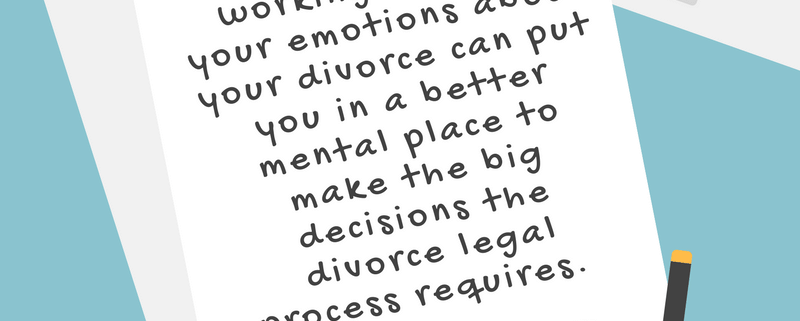6 Ways Divorce Therapy Can Change You For The Better
 If divorce and co-parenting woes are making you so overwhelmed that you’re struggling to function at home and at work, divorce therapy can help. Here’s how.
If divorce and co-parenting woes are making you so overwhelmed that you’re struggling to function at home and at work, divorce therapy can help. Here’s how.
Clarity: You need a clear head to make decisions that will affect you and your children for the rest of your lives. Your attorney is your guide through the legal process, but a divorce therapist is there to help you navigate your emotional issues. This is important: working through your emotions with a therapist can put you in a better mental place to make the big decisions divorce requires.
Help managing “emotional reactivity.” Divorce can be traumatic, so it’s understandable that you may experience mood swings and anger outbursts. But you must take responsibility for managing your feelings in order to resolve conflict, establish a healthy co-parenting relationship, and model resilience to your children. A therapist trained in divorce can help you process the grief and shame that often accompany the dismantling of a family, and also assist you in developing coping skills so you can better handle the stress of divorce.
Communication strategies. Your marriage may have ended in part because you and your ex had incompatible communication styles. Now you’re in the challenging position of having to communicate with someone you seemingly can’t communicate with! Divorced couples often have hidden agendas when communicating: they want to set the other straight, make them feel guilty, or write or speak in a dramatic fashion in order to bait the other person. Dysfunctional communication can keep conflict going indefinitely. Even if your spouse continues to stir up drama, a divorce therapist can teach you how to manage your part of interactions. In divorce therapy, you will learn strategies for defusing conflict by sidelining feelings and opinions, and sticking to facts and logistics.
Set and keep boundaries. Ignoring your own or other people’s boundaries generates conflict and often puts children in the middle. Part of divorce is accepting that you have two households and often, two parenting styles. You don’t have to like it, but if you want any peace of mind for yourself and your children, you need to get clear on boundaries. Don’t try to control what the other parent does in his house. And don’t over-accommodate your ex “to keep the peace” or allow him or her to violate court orders (you may have to go back to court to enforce them).
Understand co-parenting and parallel parenting techniques. Effective co-parenting requires two people who believe that children have a right to a relationship with both parents. They realize that this basic right trumps their own feelings about their ex. When both parents put the children first, they’re usually able to negotiate differences in an amicable fashion. But if one or both parents remain highly emotionally reactive to the other, attempts at co-parenting will not be successful and can even generate more conflict. In these situations, Parallel Parenting can help defuse conflict by limiting contact between parents. A therapist trained in divorce can help you decide which parenting paradigm is best for your situation and train you in implementing your parenting plan.
Get unhooked from your ex. Does your ex make you feel incompetent? Stupid? Irresponsible? Inferior? Are you unable to shrug off feelings of anger and fear? While it’s normal to experience temporary reactions to your ex’s behavior, being unable to extricate yourself from an emotional maelstrom suggests something else is going on: you’re having a trauma response from old wounds, some of which go back to childhood. Staying psychologically entangled with your ex will fuel conflict indefinitely, bleed over onto your children, and just generally make you miserable. A divorce therapist will help you process the grief and shame caused by divorce and past traumatic events. Your therapist will also help you focus on what you can control (your own choices) and what you can’t (your ex’s choices).
Once you understand your triggers and are able to implement coping skills, your functioning will improve. You will have a clear head when making legal decisions. You’ll know when something’s worth fighting for, and when to compromise. You will start working through the emotions underlying conflict. You will be a better parent to your children because your divorce will no longer run your life — you will run your divorce.
Is your divorce stress related to legal struggles you’re facing? Have questions about your divorce, or related issues, such as child custody? We can help. Contact us to schedule your initial confidential consultation. Take the first step towards peace of mind and a secure future. Call us today: (888) 888-0919.
Read More:
High Conflict Divorce: 5 Things Your Therapist Can Do To Help




